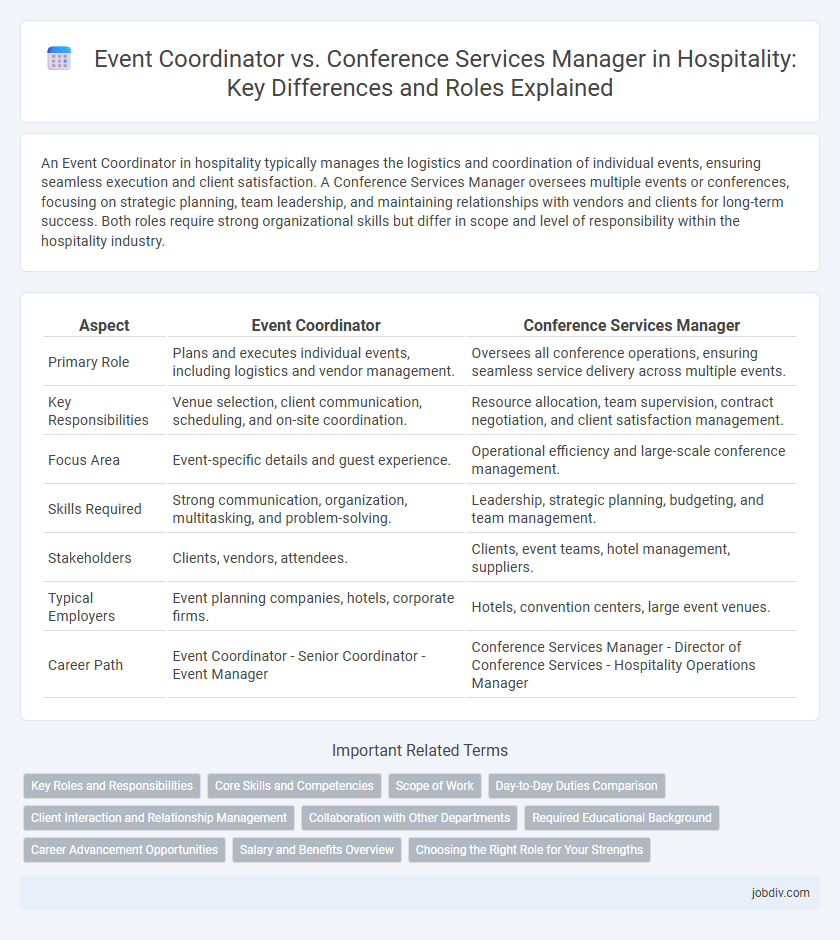An Event Coordinator in hospitality typically manages the logistics and coordination of individual events, ensuring seamless execution and client satisfaction. A Conference Services Manager oversees multiple events or conferences, focusing on strategic planning, team leadership, and maintaining relationships with vendors and clients for long-term success. Both roles require strong organizational skills but differ in scope and level of responsibility within the hospitality industry.
Table of Comparison
| Aspect | Event Coordinator | Conference Services Manager |
|---|---|---|
| Primary Role | Plans and executes individual events, including logistics and vendor management. | Oversees all conference operations, ensuring seamless service delivery across multiple events. |
| Key Responsibilities | Venue selection, client communication, scheduling, and on-site coordination. | Resource allocation, team supervision, contract negotiation, and client satisfaction management. |
| Focus Area | Event-specific details and guest experience. | Operational efficiency and large-scale conference management. |
| Skills Required | Strong communication, organization, multitasking, and problem-solving. | Leadership, strategic planning, budgeting, and team management. |
| Stakeholders | Clients, vendors, attendees. | Clients, event teams, hotel management, suppliers. |
| Typical Employers | Event planning companies, hotels, corporate firms. | Hotels, convention centers, large event venues. |
| Career Path | Event Coordinator - Senior Coordinator - Event Manager | Conference Services Manager - Director of Conference Services - Hospitality Operations Manager |
Key Roles and Responsibilities
The Event Coordinator manages the planning and execution of specific events, focusing on logistics, vendor coordination, and client communication to ensure seamless operations. In contrast, the Conference Services Manager oversees the broader scope of conference planning, including venue management, budgeting, and staff supervision to guarantee successful large-scale meetings. Both roles require strong organizational skills, but the Conference Services Manager typically handles strategic planning and overall service quality across multiple events.
Core Skills and Competencies
Event Coordinators excel in multitasking, client communication, and on-the-ground logistics management, ensuring seamless event execution. Conference Services Managers possess strong leadership, strategic planning, and vendor negotiation skills, overseeing large-scale conference operations and coordination. Both roles require proficiency in budget management, time management, and detailed organizational abilities to drive successful hospitality events.
Scope of Work
An Event Coordinator manages the planning and execution of individual events, focusing on logistics such as vendor coordination, guest services, and on-site troubleshooting. A Conference Services Manager oversees broader conference operations, including contract negotiation, client relations, and coordination between multiple departments to ensure seamless event delivery. While both roles require strong organizational skills, the Conference Services Manager handles strategic planning and larger-scale event portfolios compared to the Event Coordinator's detailed event-level responsibilities.
Day-to-Day Duties Comparison
Event Coordinators handle the logistical planning and execution of individual events, managing tasks such as vendor coordination, client communication, and on-site event support to ensure seamless operation. Conference Services Managers oversee multiple events within a venue or facility, focusing on resource allocation, staff supervision, and maintaining service standards throughout the conference lifecycle. Both roles require strong organizational skills, but Event Coordinators prioritize detailed event-specific tasks, while Conference Services Managers emphasize broader operational management and client relationship oversight.
Client Interaction and Relationship Management
Event Coordinators prioritize direct client interaction by managing event details, preferences, and real-time communication to ensure a personalized experience. Conference Services Managers focus on long-term client relationship management, overseeing multiple events and maintaining consistent service quality across all engagements. Effective communication skills and proactive problem-solving are essential for both roles to build trust and foster client satisfaction in the hospitality industry.
Collaboration with Other Departments
Event Coordinators and Conference Services Managers both engage in cross-departmental collaboration to ensure seamless event execution, often liaising with catering, audiovisual, and marketing teams. Event Coordinators typically focus on real-time communication and logistics between departments during events, while Conference Services Managers oversee strategic planning and coordination to align departmental objectives with client needs. Effective collaboration improves operational efficiency, enhances guest experience, and drives successful event outcomes in hospitality management.
Required Educational Background
Event Coordinators typically require a bachelor's degree in hospitality management, event planning, or communications to ensure proficiency in organizing and promoting events. Conference Services Managers often hold a degree in hospitality, business administration, or marketing, emphasizing skills in large-scale event logistics and client relations. Both roles benefit from certifications like CMP (Certified Meeting Professional) to enhance expertise and career advancement in the hospitality industry.
Career Advancement Opportunities
Event Coordinators often gain hands-on experience managing logistics at smaller-scale events, providing a foundation for advancing to senior roles within hospitality management. Conference Services Managers oversee larger, complex events and lead teams, demonstrating leadership skills that are critical for higher executive positions such as Director of Event Operations or Hospitality Manager. Career advancement typically involves expanding responsibilities in strategic planning, vendor negotiation, and client relationship management, enhancing prospects in the competitive hospitality industry.
Salary and Benefits Overview
Event Coordinators typically earn an average salary ranging from $40,000 to $55,000 annually, with benefits including health insurance, paid time off, and modest performance bonuses. Conference Services Managers command higher salaries, often between $60,000 and $80,000 per year, reflecting their greater responsibilities, and usually receive comprehensive benefits packages featuring retirement plans, professional development funds, and enhanced bonus structures. Salary variations depend on the organization's size, location, and the individual's experience within the hospitality industry.
Choosing the Right Role for Your Strengths
Event Coordinators excel in managing detailed logistics and client communications, making them ideal for those who thrive in fast-paced environments and multitasking. Conference Services Managers focus on overseeing large-scale event operations and vendor coordination, suited for individuals with strong leadership and organizational skills. Assessing your strengths in detail orientation versus strategic management helps determine the best fit between these hospitality roles.
Event Coordinator vs Conference Services Manager Infographic

 jobdiv.com
jobdiv.com